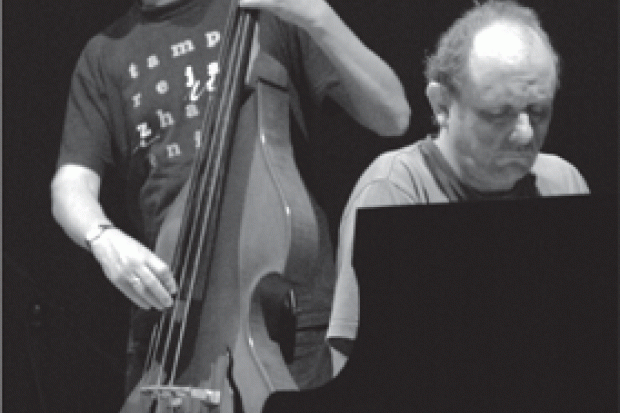
Cover art from the new Jimmy Cake album, featuring a painting by Jack Teagle.
Thank God for The Jimmy Cake
Thank God for The Jimmy Cake. Around in various line-ups since 2000 and now on their fourth studio album, Master, the group have seemed at times to be lonely flag wavers for a certain kind of fringe musical culture in Ireland.
Whereas nearby countries such as the UK and Germany boast dappled, disparate fringe popular-music scenes, Ireland hasn’t really been able to match those countries in terms of scenic infrastructure or musical activity, despite the great efforts of various individuals. Alternative, experimental, fringe rock music of the sort made by the Jimmy Cake would thrive in such a context, but alas groups like this are left somewhat to plough their own furrow. That the Jimmy Cake have made it to year fifteen and album four says a lot about their perseverance.
Master, a three-track album that’s as fierce as any in their catalogue, particularly as compared to their lusher third album, Spectre and Crown, kicks off with the marvellously titled ‘Death Can Fuck Off’, a 32-minute perpetual motion machine that speeds on and on into the light. Here, as on the other tracks, the band use elongated patterns of short crunchy grooves, repeated and repeated until tension is at fever pitch, before release and then further intensification with a change in register or a slip into a new groove state.
This kind of musical patterning is all over the album. The middle track, ‘Observatory Destroyer’ plays out perhaps the most interesting elongation on the album, where the music gradually ebbs away, then builds, and then ebbs again before huge synth and guitar riffs finally slab against caveman drums in a dance to the end.
This build-and-release narrative sometimes see energy transferring into a lower register in order that the eventual intensification and climax will feel all the more satisfying. This happens halfway through ‘Death Can Fuck Off’, where we reverse back to an earlier pitch of intensity so that we might build once more, and similarly on ‘Observatory Destroyer’, whose blistering punch arcs out into swoops of cavernous electronic sound at points along its bendy course.
Either way, what’s key is that the current line-up, which boasts Patrick Kelleher, Lisa Carey and Paul G. Smyth on synths (amongst other things), Vincent Dermody on guitar, John Dermody on drums, Parx on trumpet and Dip on bass (and everyone on vocals), is always on top of its instrumental and dramatic game, whether it’s engineering pile-driving surges or taking diverting detours into fragmentation.
Whatever the character of the material – and the group peppers its post-space/krautrock template with everything from a bastardised quasi-Queens of the Stone Age beat to avant-jazz breakdown on the piano-led middle stages of the steamrolling closer, ‘Teen Mist’ – what’s always at stake here is compulsion, of the musicians, the material and the listeners. As we listen we speed along with the music, joyous and unfurling, sometimes stopping to take breath, mostly sprinting as fast as our legs will allow. The band themselves, listeners before they’re anything else, are caught up in the joyride like the rest of us.
If there’s a risk with such full throttle, single-minded focus, it’s that the screw will tighten so much that something ends up snapping, whether it’s our attention or the musical material itself. And I’m not sure the Jimmy Cake avoid that trap – passages of the opening and closing tracks don’t hold attention as well as they might, for example. But to my mind the group largely succeed in taking us along for the ride, dulling any suspicions of speed with more of it and with more thrills along the way.
Published on 28 August 2015
Stephen Graham is a lecturer in music at Goldsmiths, University of London. He blogs at www.robotsdancingalone.wordpress.com.












